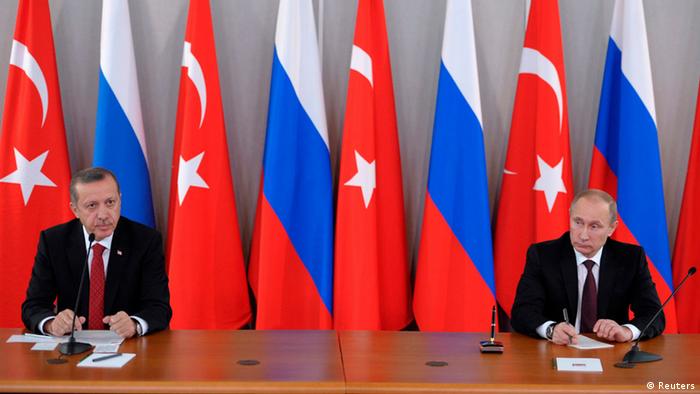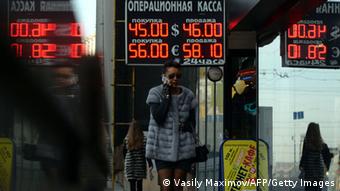Political rivals, Turkey and Russia focus on trade
Political rivals, Turkey and Russia focus on trade
Turkish and Russian leaders hope for a boost to business ties between the countries ahead of Russian President Putin's visit to Turkey. Neither side wants political differences to strain bilateral trade relations.
Russian President Vladimir Putin will travel to Turkey to take part in a session of the High Level Cooperation Council, similar to a joint cabinet meeting for both countries.
But despite the council's name, the meeting between Putin and his Turkish counterpart, Recep Tayyip Erdogan, is unlikely to be of overly cooperative nature. Both key powers in the Black Sea region as well as in the Middle East, Russia and Turkey encounter each other rather frequently on the international stage - more often than not at odds with each other's political aims.
The Syrian crisis, for example, saw Erdogan calling for the removal of Bashar al-Assad from power, whereas Putin is regarded as one of the Syrian president's most important international allies. In the Ukraine crisis, Turkey openly criticized the annexation of the Crimean peninsula, which is only an hour's flight from Istanbul and home to the Crimean tartars, a people related to the Turks.
Harsh rhetoric to be expected?
Russia expert Kamer Kasim said he does not expect a major policy shift on any contentious issues during Putin's trip to Turkey.
"The positions of both sides remain unchanged," the vice president of the Ankara-based think tank USAK told DW.
There were even problems in bilateral trade, according to Kasim. While the Turks predominantly buy natural gas from Russia, covering 65 percent of their requirements with Russian gas, Turkish exports into Russia have continued to decrease, from $5.1 billion (4.1 billion euros) during the first three quarters in 2013 to $4.5 billion for the same timeframe in 2014. Turkey is facing a growing gap between declining exports to Russia and rising imports, Kasim said.
Given that neither Erdogan nor Putin is known for avoiding altercations, it would be logical for them to go public on those controversial issues, using harsh rhetoric. However, this is not likely to be the case. "In spite of all the problems both sides make an effort to use diplomatic language," said Kasim.
With agreement elusive on many issues, both states seem determined put aside contentious issues and focus on improving cooperation wherever possible, Kasim said. The Russian state-owned Rosatom nuclear energy corporation is tasked with constructing Turkey's first nuclear power plant in Akkuyu on the Mediterranean coast, expected to begin operations within 10 years. The Turkish tourism industry also makes billions thanks to almost 4.3 million Russians visiting annually.
Turkey not complying with sanctions against Russia
In addition, Turkey sees at least a theoretical chance of compensating for export losses triggered by unrest in the Middle East with increased exports into Russia, said Orkhan Gafarli, an analyst at the Ankara-based New Turkey Center for Strategic Studies. To this end, Ankara pursues some unusual avenues. Turkey is not complying with the Western sanctions imposed on Russia because of the Ukraine crisis. Turkish government circles argue that Ankara did not believe such sanctions were likely to have an effect on Russia, Gafarli told DW. At the same time plans to stop using the US dollar to measure bilateral trade and use the rouble and lira instead are under consideration.
Furthermore, Erdogan's occasionally harsh anti-Western statements continue to be monitored with great interest in Moscow, according Gafarli. While Russian leaders understand that Turkey, as a NATO member and EU candidate, belongs to the West, yet the Russians still have been trying to win Ankara to their side to any extent possible, Gafarli said.
In this context, the debate over Turkey joining the Shanghai Five organization - currently made up of China, Russia, Kazakhstan, Uzbekistan, Kyrgyzstan and Tajikistan - could be back on the agenda. In the past, Erdogan had been contemplating openly about turning his back on the EU in favor of the Shanghai Five. Turkey became one of the organization's official "dialogue partners" in 2012. dw de


Comments